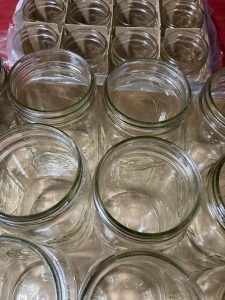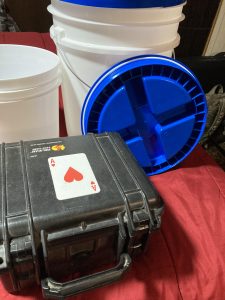I’ve not gotten a lot done the last two to three weeks, but I did get one truly constructive thing done. Before we get into that, some quick thoughts I can’t remember if I covered in Preparedness Pays, but need to add if I didn’t.
Disaster preparedness should NOT be overwhelming. Yes, the potential number of disasters is indeed an infinity-minus-one situation. However, there are only four things that can truly happen to you in the event of one or more happening at once. Also, remember that “emergencies” come in just three flavors: inconvenience, emergency, and disaster.
If you have a basic level of preparedness, it automatically puts most “emergencies” into the inconvenience category. By basic, I mean the ability to provide light, water, heat, food, etc. when faced with a temporary loss of services. It means things like flashlights, candles, water-on-hand, canned or frozen food, means of heating food or a room, and similar things.
Power goes out for up to 24-hours, ho-hum. You have flashlights, a camp stove, and backup power for cell phone, laptop, etc. Water goes out for same, you have water to rinse the soap off in the shower, drink, cook, and even clean a bit at need. And, well, you get the drift. What would otherwise be an emergency is reduced to an inconvenience.
Where it gets fun is where things move from an inconvenience to an emergency or a disaster. In that case, you need to have food stocks above and beyond being prepared for a few days to a couple of weeks. This is where dried foods come in to play.
What you are looking at is up to a month’s worth of food or food augmentation in the event of things going truly sideways into emergency or disaster. Yes, I do mean weeks, as if it slides into full emergency or disaster status you best be rationing.
I am playing with the concept a bit, as this is a general kit really designed for augmentation of limited rations. It features two quart jars of all-purpose flour, one quart of iodized salt, two quarts of dried beans, two quarts of enriched rice (remember, rice plus beans equals effective complete protein), two quarts of quinoa (a complete protein on its own), one quart of green lentils, one quart of oats, and one quart of white sugar. In a major disaster, it will get several people by for several weeks.
When you add in canned meats, vegetables, and fats, you have a month of rationed nutrition for several people. Seriously, add in a small tub of lard, canned meat, and some canned vegetables, and you have a variety of tasty options for very nutritious meals. Add in a shelf-stable jar of ghee, and the oats become very nutritious oatmeal for breakfast. Remember that in emergencies/disasters it is not just the absence of food, but the absence of the right type of foods that poses the largest threat.
Fats are one of the hardest things to get when in a survival situation. I very much remember being told that six large moths a day would give you the minimum amount of fat needed for survival. Moths are amazing creatures, however dusty is a word that comes to mind and not-tasty also pops to mind. Emergencies and disasters DO NOT need to be survival situations in terms of food. If you think and plan ahead, you can put that off a good while.
One thing I will strongly recommend is to have some canned salmon as part of your canned meats. Salmon is a great source for a variety of oils that are critical to the body, including the eyes. Yes, tuna has some of the same, but it takes more tuna to equal the content of the salmon.
But, back to the dried foods. Stored properly, dried foods can last for ten to twenty years. There are those who promote low-temperature canning in the oven to preserve them. The idea is that the low temperature of 200 degrees will kill any insect eggs/larvae in the dried products, along with harmful pathogens, without damaging the dry goods. There are as many (if not more) who disagree.
I got curious and did an experiment. I then talked with some people who know a thing or two about food preservation (and at least one has the certifications to go with same). Short version is that I have to come down on the side of those who say not to do the oven canning. It stresses the jars, it stresses the contents, and it does not guarantee proper canning of the materials.
So, since my seal-a-meal system is in storage, I checked out something else. A rechargeable, hand-held jar vacuum sealer.
It uses fairly standard connectors, which means you should be able to recharge it using the same systems used for your cell phones and other electronics in an emergency. It also gives you the ability to re-seal at least some jars and foods in an emergency or disaster, which can be a distinct plus.
For me, the drawbacks to these systems boil down to two things: not being sure they are as powerful as a good counter-top system and the lack of data. The handhelds (sold under several brand names) do not give much data, so you have no idea of how much vacuum you have established. In my case, to be safe, I used 500cc oxygen absorbers in the jars to be safe. It seems like a strong seal/vacuum, but in the absence of data I prefer to err on the side of caution. On the whole, however, recommended.
CAVEAT EMPTOR DANGER WILL ROBINSON DANGER CAVEAT EMPTOR
Neither the government nor anyone else considers oven canning or vacuum sealing to be proper canning. In doing either you run the risk of mold, mildew, botulism, and other delights. There are websites that will take this into extreme detail if you are interested. You need to keep an eye on things and anytime lids are trying to pop, bulging, etc., skip it. I look for signs of discoloration or growth as well.
/END CAVEAT EMPTOR
That now said, if you sterilize your jars and do all the things as you should be doing, I see the risk as low for vacuum sealing. Me, I want to continue to play with this a bit and put together some specialty packages, such as a baking package with different flours, baking soda, cocoa powder, etc. Maybe do a breakfast package of grits, oats, and other things that will make a good solid breakfast. I also want to play with various spices, whole primarily, in jelly jars for both portion control and for trade. If you hit the Indian/Asian markets, you can get an amazing array of whole spices as well as some ground that may (repeat, MAY) do well with vacuum sealing.
I’m also planning to seal some basic pasta (water/flour only types) and similar items. Such items allow you to augment and expand food so that not only is nutrition satisfied, so is hunger. It’s a way to bulk up without having to store a lot of bulk.
Also, when you buy the jars, buy extra lids at the same time. This gives you a way to use the jars multiple times, and to do real canning at need even in an emergency or a disaster.
Before I forget, it’s a great idea to stock away some raw local honey. The great thing about honey, especially raw, is that if it hasn’t been adulterated, it lasts not for hundreds of years, but even thousands. Honey in various tombs and other sites that are thousands of years old is still edible and nutritious. Honey has medicinal and other uses (amazing preservative used in early jerky) as well. I will just note that a few gallon jars can go a long way and last one heck of a long time.
I will admit to one benefit from this little experiment. I had left-over beans, lentils, etc., so I threw them into a pot with some bone/other stock. I then cut-up and threw in some kielbasa I found that had no added sugar, corn syrup, or other crap. I’ve now got several containers of delicious soup/stew in the freezer.
So, I will continue to experiment and put away as much dry food as I can. Dry foods will need water, which I continue to see as the key item for all scenarios. I really do want to upgrade my water purification systems, as well as to find ways to upgrade my water-on-hand.
Remember, preparedness pays (always!). Keep your things where you can find them in the dark, and be prepared.
Getting hit by lightning is not fun! If you would like to help me in my recovery efforts, which include moving once we have medical issues cleared up, feel free to hit the fundraiser at A New Life on GiveSendGo, use the options in the Tip Jar in the upper right, or drop me a line to discuss other methods. It is thanks to your gifts and prayers that I am still going. Thank you.








